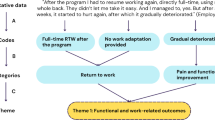
"Employees desire autonomy in deciding how and when to reduce sedentary behaviors while working from home. They seek organizational support for these initiatives and want to incorporate social interactions into their routines."
"Many employees feel a lack of trust while working remotely, making them hesitant to leave their desks. They emphasize the importance of knowing about the health risks posed by excessive sedentary behavior."
"It is crucial for organizations to develop multi-component interventions aimed at reducing sitting time in home-office settings. This includes fostering accountability and recognizing efforts to adopt healthier habits."
"Education on the adverse health outcomes linked to high sedentary behaviors is vital. Employees express a need for reward systems that acknowledge their efforts to change their behavior."
Working from home significantly increases sedentary behavior among desk-based workers, leading to various health risks. Employees express a desire for autonomy in reducing sedentary time and seek organizational support that includes social elements. Lack of trust while working remotely contributes to reluctance in leaving desks. Education on the negative health consequences of high sedentary time is crucial, along with accountability measures and rewards for efforts to change behavior, emphasizing the need for comprehensive interventions to address these challenges in home-office environments.
Read at Nature
Unable to calculate read time
Collection
[
|
...
]